You are living at your parents’ house and thinking, how much money do I actually need to start living alone?
This question has a different answer for everyone but we will look at some guidelines to help you figure it out for your personal situation.
Your parents pay for so many things that you probably don’t even have a clue about, so many bills that need to get paid every single month. If you can, and your parents will have you, my advice would be to stay as long as you can in your parental home to save money for your future.
Moving out and living alone for the first time can be exciting or scary, but you should spend some time thinking about the financial situation before making the big jump!
Let’s talk about it in this blog post and help you figure out what to do or when you can make the big leap of finally living alone.
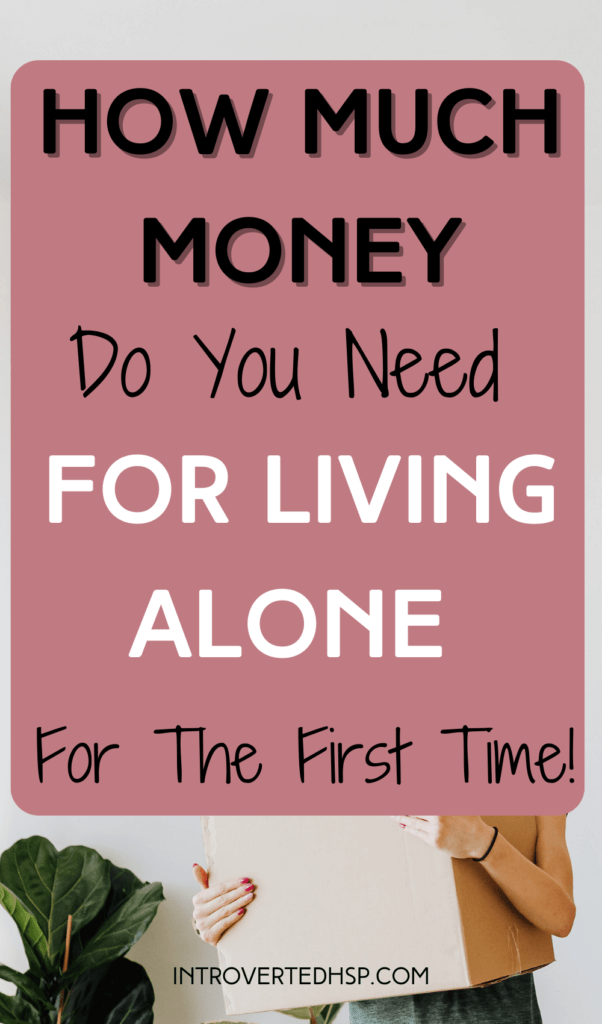
This post may contain affiliate links, which means if you make a purchase through these links, I may receive a small commission at no extra cost to you. As an Amazon Associate I earn from qualifying purchases. Please read my disclosure for more info.
Living Alone Expenses
When calculating how much money you need to afford living alone, you must create a budget. Figure out what your monthly expenses will be.
Start listing all the fixed costs you will have and make good estimates for variable expenses. The biggest costs are most likely to be housing costs, transportation, and food.
Let’s make a list of every possible spending category. When you know more or less what you will spend on everything, you know how much money you need to start living alone!
Also, check out my blog posts about budgeting to help you even more with this!
1. Housing
The biggest cost of all is paying for your housing. This can be paying rent or the payment of your mortgage every month.
Whether you decide to rent or buy will depend on your budget, but also on your need for freedom. If you don’t want to stay in the same place for too long, maybe renting is a better option or you will have to sell or rent out your house every time you want to move out.
For most people who want to move out of their parent’s house as soon as possible, renting will be the only option to start unless your family is wealthy and they buy you a house!
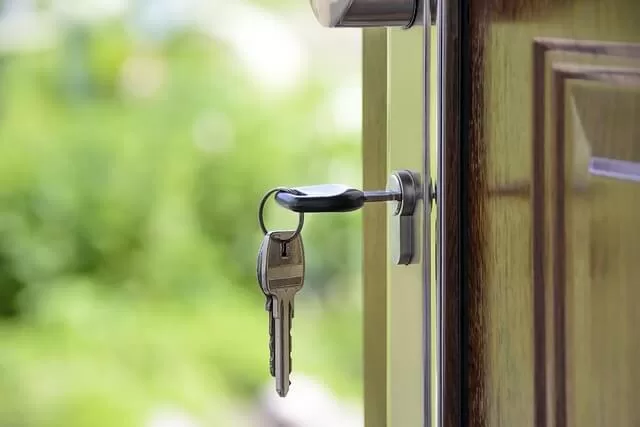
Buying a studio/apartment/house
If you want to buy a house, you need to know which costs are necessary to pay upfront and during the mortgage payments. Before you can even get a mortgage, you will have to have money saved up for your downpayment, which is usually a big sum of money, and get a loan from a bank.
There are also registration costs and notary costs you will need to be able to pay from the start. So before you can buy, you must have quite some savings.
When buying a house, you also have to pay property tax every year and are responsible for the maintenance and repairs. You also can’t buy a house without taking insurance.
All of these costs depend on how big the house is and in which area you will be living. Big cities are often more expensive than countryside houses. And of course, a house will cost more than a studio or an apartment.
When you are living alone for the first time, an apartment or studio will probably be the best fit as this is cheaper and less work to maintain and clean. You shouldn’t buy more rooms than you need unless you want to share your space with roommates or rent out a room for example.
Renting a studio/apartment/house
Most people will start renting a studio or apartment. Your landlord will ask for a security deposit and most of the time for the first and last month’s rent to be paid upfront. This cost can be a lot smaller than a downpayment to buy a house would be.
You will have a contract that states how much rent is due every month. This can be adjusted over the years but you can always reevaluate it and end your contract if you want to look for a cheaper place. Most contracts don’t allow you to end it anytime you want without paying some sort of fine so discuss this with your landlord before signing anything!
When you are renting, you also have to have insurance. The property owner will have to pay for some repairs and maintenance but there will still be some costs that will be for you. You won’t be paying property taxes but it can be that the landlord asks for more rent to provide for the property taxes that they have to pay.
Try to find a place that is as cheap as possible but still nice to live in. You don’t want to be totally isolated from your friends and family if you want to spend time with them. The location, the living area, and the newness of the building will determine how much you will have to pay.
2. Transportation
Another big sum of money will go to transportation costs. You could save a ton on transportation if you are a sports person who does everything on foot or by bike. But most people will need a car or public transportation to get to work or meet with family or friends.
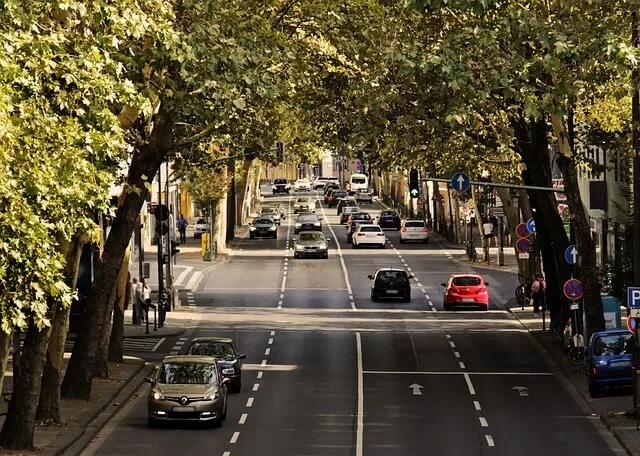
Car
When you want to be a car owner, you must pay for the car but there are many more costs to this. You can buy or lease a car. When you buy a car, it would be best to pay it upfront but if you can’t, you can make payments every month until it is fully yours. When you lease a car, it will never be fully yours so you can’t sell it like you could with your own car.
So there is the money you need to pay for the car, but you also need to pay for many other things related to the car. Car insurance can get pretty high depending on your age, driving experience, size, and the newity of your car. Try to compare different insurances to get the cheapest one that is still good in case you crash your car.
Car maintenance can also cost you some money. Every year your car needs a check-up at a garage and this ain’t cheap. Parts of the car will need to be replaced when they break or tires need to be replaced every few years depending on your car usage.
Depending on how much you drive your car and at which gas station you fill up your tank, you will pay a lot for gas as well.
When you park your car in a space where you need to pay for it, you will have to pay for the parking fees.
Public Transportation/Taxi
When you don’t want the burden that paying for a car can be or maybe you simply can not afford it, you have to use public transportation or a taxi to get you somewhere.
The costs that come along with taking public transportation will be the cost of the tickets. And when taking a taxi, you will pay for the kilometers the taxi has to drive or the time spent.
It sounds a lot cheaper but public transport tickets can add up if you have to use it every day. It’s also a lot less convenient than taking the car especially if you live more in the countryside where there aren’t that many options for public transportation. Nevertheless, public transportation will be cheaper than owning a car because it is less convenient and you don’t own anything.
3. Food & Groceries

Another big spender on the list of expenses you need to take into account when you start living alone is food and groceries.
This expense can go anywhere from buying food in the supermarket to ordering takeout or dining out. When you have to live on a small budget, you might eat at home as much as you can as this is much cheaper than going to restaurants.
With groceries, I also mean things you buy in the supermarket for cleaning and personal care. These are things like shampoo, cleaning supplies, tissues, toilet paper, toothpaste, etc.
These things can be just basic living needs or be more extravagant when you go out for dinner a lot and buy fancy personal care products and unnecessary but nice stuff in the supermarket.
You might also like this blog post about saving money on groceries! Check it out if you want to save more so you can spend more money on things you value!
4. Utilities
Number four on the list of living alone expenses are utilities. Utilities are things your house needs to function properly. Things like water, electricity, gas, sewer, trash, etc. You can also count your phone bill, cable, and internet as utilities.
These are also things everyone has to pay if you want running water or to be able to heat your home, but if you check different providers, you might be able to save some money on your utilities.
When you rent a house or apartment, the cost of the utilities is sometimes included in the rent, ask about this before signing the contract as you need to know whether or not it fits your budget. Also, make sure which utilities are included in the rent! If they are all included in the rent, it’s normal that the rent will be a lot higher. Then you know that you can put on the heat as much as you like in winter because you are paying a set amount of rent each month.
When you have to pay for the utilities, research the internet for tips on how to save money on each of them to get the most out of your money.
5. Health Care

Taking care of your health is of massive importance! Health care can be expensive and it varies much depending on where you live and how healthy you are living your life.
You probably should pay for health insurance in the first place. When you have insurance, you will feel more secure and have less high health care expenses. Health care expenses are anything from dentist’s and doctor’s appointments to medication and over-the-counter items.
In a worst-case scenario, there are also medical operations that may need to be paid but this is where an emergency fund will come in handy. Start saving for an emergency fund as soon as you can to be prepared for any type of emergency.
If you want to avoid emergency dental appointments, which also cost lots of money, read my blog posts about keeping your teeth as healthy as they can be!
6. Clothing
When you first start living alone, chances are that you will have a lot of clothes already that your parents bought you when you were still living there. If this is the case and you have most of the items you need, you can stop yourself from buying clothes just because you feel like buying something new.
If you don’t have all the clothes you need, buy all the necessary items first. Buying clothes that you would like to have is a nice extra but not a necessity. You can set yourself a clothing budget and if you don’t use it put that money into your savings or use it for next month’s budget.
You can also go for second-hand clothes or try to only shop when sales are going on. This can save you a lot of money!
Try to focus on buying quality instead of quantity to get the most out of your clothes in the long run. It can feel painful to spend a lot of money on a piece of clothing but try to look at it as ‘cost per wear’. When you pay a lot for a piece of clothing you wear every day, the cost per wear will be very small in comparison to a cheaper item you only wear a few times.
7. Self-Care

Self-care is so important to keep you sane! Fortunately, this doesn’t have to cost a whole lot of money. But it is nice to set aside a budget for doing things like getting a massage, spending money on some scented candles, talking to a therapist, or taking yoga or other sports classes.
The amount of budget you set aside for these things is up to you. Self-care isn’t always spending a lot of money on yourself. Read my blog post about self-care without spending a lot of money on some great ideas.
When you are living alone and have no one to look after, you should be able to spend some time doing self-care activities. Enjoy it!
8. Entertainment
We all want to enjoy ourselves and this looks different for everyone. When you let yourself go, you probably would spend a lot of money on entertaining things, but you need to make sure that you don’t go into debt doing this!
Entertainment is a pretty broad category, it contains everything that can bring you joy or pleasure from doing it. These can be solo activities or things you enjoy doing alone, but also social gatherings. Having a budget for the entertainment category is a very good idea because it is so easy to overspend on this category!
Let me give you a few examples. Subscriptions like a Netflix or Spotify subscription can be in this category, going out for drinks with your friends, concert tickets, a weekend away or a holiday, a PlayStation and some games, going to a theme park, spending money on buying books, the list goes on and on.
9. Education
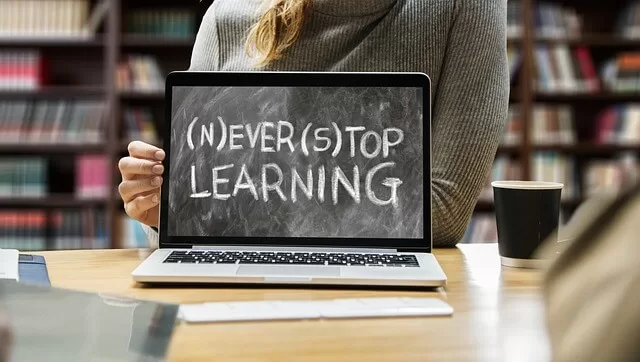
People love to learn new things and get educated on things they want to know. You can keep learning for the rest of your life and keep improving yourself this way.
Education can be free, there are a lot of great resources on the internet and in books from the local library. There are also a lot of paid options online and live. Maybe you want to follow a workshop about something you are passionate about or follow an online course learning a new skill.
Invest in yourself by putting some money into your education. You are never too old to learn and you will love having new insights and skills and to keep growing.
It’s also a good idea to educate yourself more on personal finances as most people aren’t financially educated when they graduate from school.
10. Gifts
If you have a family, friends, coworkers, or just one of them, gift giving will be part of your year. This is also a category for which a sinking fund can be put in place.
You can go over all the gifts you need to give for an entire year to estimate your budget for this category. Think about all the people that you will have to buy gifts for. For birthdays, Christmas, Mother’s Day and Father’s Day, New Year, Valentine’s Day, Baby showers, Retiring coworkers, and just because gifts.
Set some money aside every month to save for buying presents for your loved ones.
If you want some inspiration about buying gifts for introverted people, check out this blog post as well.
11. Pet Care

When you are living alone and especially when you can work from home, maybe it would be nice to take care of a pet. Having a pet can bring a lot of joy and will make you feel less alone. Pets can give you a lot of love!
Pets aren’t free, and depending on which pet you own, you will have more or less costs for it. Dogs can be quite expensive! It’s not only the costs you have when you buy them and get them vaccinated, you have to feed them and the big costs would be for medical veterinary care if they need it.
You will have some basic startup costs as well, so estimate a budget for a nice and cozy basket, a drink and food bowl, a collar, a good leash, some grooming tools, and maybe a few toys.
There will also be recurring costs such as food, poop bags, shampoo, and yes even toothpaste which are more difficult to estimate beforehand but you could give it a try.
Make sure you can afford to be a pet owner before you buy own, because those lovely animals only deserve the best care there is!
12. Miscellaneous
The miscellaneous category contains every expense that can not be put into another category on the list. You can also create more categories to fit your personal life than I created in this list.
How much money do you need to start living alone?
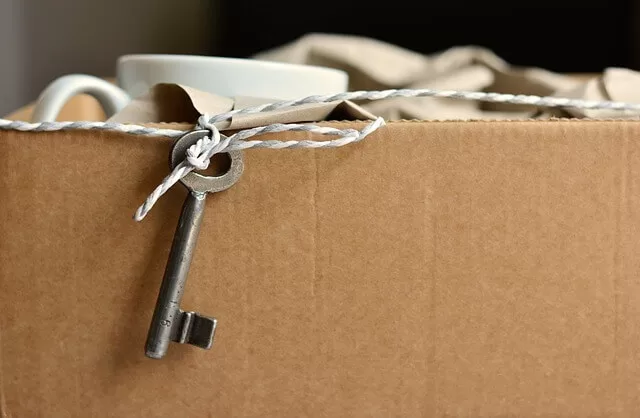
So after reading this blog post, you have some more work to do to figure out how much you will need to start living alone.
I hope with all the expenses listed above you can start figuring it out, calculating everything that you need to live your life, and give it your best estimate.
I think the most important thing is to always try to live below your means. When you do this, you will be able to save money and create a better future for yourself.
Keep living with your parents for as long as they will have you, of course also contributing something because they shouldn’t be paying everything for you when you have a job.
You should also want to stay yourself obviously if you hate living at home, try to get your independence and look for a place to yourself. When you are open to the concept of having a roommate, maybe consider this as that can also save you a lot of money, and housing costs are split in two.
I wish you all the best of luck moving out! Prepare yourself well and you won’t be as much surprised as you could be from living alone for the first time.
